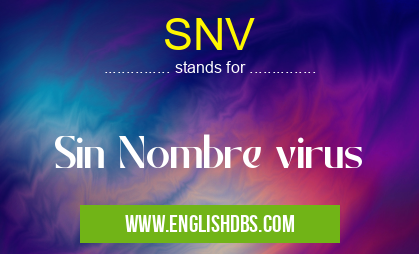What does SNV mean in HEALTHCARE
SNV stands for Sin Nombre virus, which is a hantavirus that can cause a form of Hantavirus Pulmonary Syndrome (HPS). The hantavirus is primarily spread through contact with the urine, feces, or saliva of infected rodents. SNV was first identified in 1993 in New Mexico and has since been found throughout the United States. Additional cases have also been identified in other countries, including Canada and South America. It is important to understand the risks associated with SNV and how to protect yourself from infection.

SNV meaning in Healthcare in Medical
SNV mostly used in an acronym Healthcare in Category Medical that means Sin Nombre virus
Shorthand: SNV,
Full Form: Sin Nombre virus
For more information of "Sin Nombre virus", see the section below.
» Medical » Healthcare
Transmission
SNV is primarily transmitted through contact with the urine, feces, or saliva of infected rodents such as mice and rats. It may also be transmitted by inhalation of dust containing dried rodent droppings or urine contaminated with the virus. People may also become infected if they have direct contact with a person who has active SNV infection. The risk of infection increases in areas where there are large numbers of rodents that are actively living around human habitations such as homes and work facilities.
Symptoms
Symptoms typically appear within 1-3 weeks after exposure to SNV and may include fever, chills, muscle aches, headache, nausea, vomiting, abdominal pain, difficulty breathing and coughing. If left untreated HPS may progress to multi-organ failure and death within 36 hours of onset of symptoms. It is therefore important to seek medical care promptly if any unusual symptoms develop after potential exposure to SNV.
Prevention
The best way to prevent infection with SNV is to reduce contact with rodents. This includes sealing entrances into buildings such as cracks or holes in walls or foundations that could provide access for rodents; cleaning up any food sources around dwellings (including garbage cans); removing excess clutter where rodents can hide; avoiding contact with wild animals; and using protective gear when handling potentially infected materials such as mouse droppings or dismantling rodent nests. Additionally it is important to practice good personal hygiene including washing hands thoroughly after coming into contact with any suspected source of contamination from the virus.
Treatment
There is no specific treatment for SNV infections but supportive care should be provided that includes providing fluids intravenously during hospitalization if necessary as well as oxygen therapy if needed due to difficulty breathing caused by HPS symptoms related to SNV infection. Patients should also receive appropriate medications for pain relief along with antibiotics depending on severity of symptoms developed due to the condition.In some cases an experimental anti-viral medication might be prescribed alongside standard treatments.
Essential Questions and Answers on Sin Nombre virus in "MEDICAL»HEALTHCARE"
What is Sin Nombre virus?
Sin Nombre virus, also known as hantavirus pulmonary syndrome, is a potentially fatal infectious disease caused by any of several viruses in the Hantavirus family. This virus primarily affects rodents but can be transmitted to human through the inhalation of infected rodent droppings or urine, or contact with contaminated objects.
How serious is Sin Nombre virus?
Sin Nombre virus is a serious and life-threatening infection that can cause respiratory failure and even death. People should take prompt medical care if they experience symptoms associated with this illness.
Who is most likely to become infected with Sin Nombre virus?
Persons who come into contact with rodents or their droppings are most at risk for becoming infected by the Sin Nombre virus. Those working in agricultural settings, such as farmers and ranchers, are especially likely to encounter these animals.
What are some common symptoms of Sin Nombre virus?
Symptoms of this infection include fever, muscle aches, headache, fatigue, nausea and vomiting followed by coughing and shortness of breath. The infection develops rapidly over days to weeks after first exposure.
Are there any preventative measures against the Sin Nombre virus?
Yes! The best way to avoid getting sick from the hantavirus is to take preventive measures against contact or exposure to rodents and their droppings. This includes avoiding contact with nests or areas where rodents may live; sealing off holes or cracks where rodents may enter buildings; using gloves when handling potential rodent habitats; avoiding work in dusty or unclean environments; keeping grass mowed; and disposing of food scraps properly.
Final Words:
SNV stands for Sin Nombre virus which can cause a serious form of Hantavirus Pulmonary Syndrome (HPS) if left untreated. It is primarily spread through contact with infected rodent urine, feces or saliva but may also be transmitted via inhalation of dust particles containing dried droppings contaminated by the virus;or by direct person-to-person contact when someone who has active SNV infection comes into contact with another person without protective gear on either side . To protect yourself it's important to reduce contact with rodents , practice good hygiene , use protective gear when handling material from an animal/rodent source ,and seek prompt medical attention if unusual symptoms develop .
SNV also stands for: |
|
| All stands for SNV |
